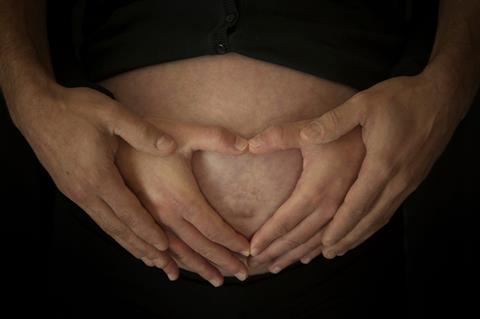Earlier this year, the first baby born with DNA from three people was widely celebrated as a breakthrough in combating mitochondrial diseases. But aside from the long term safety of the procedure, there are many ethical and moral issues that the Christian faith must speak into, says Dr Chris Wild

Earlier this month, media outlets worldwide celebrated the birth of what were widely referred to as “three-parent babies”. This ground breaking approach (technically termed pronuclear transfer), led by the Fertility Centre in Newcastle, brings hope to women who would otherwise have babies born with mitochondrial diseases that cause severe disability or death in childhood.
So how was this chain of inherited disease broken?
Faulty mitochondrial DNA in a woman’s eggs can result in disease in her children. The Newcastle team circumvented this using donated eggs. Both the mother’s and donor’s eggs were fertilised with the father’s sperm. A few hours later, the nuclei from egg and sperm in the donor’s egg were removed and replaced with those from the mother’s egg. This modified embryo was then implanted in the mother’s womb.
More and more families are facing fraught questions in relation to procreation and the nature and responsibilities of parenthood
As with any new technology, questions remain about long-term safety for the children involved. And in terms of effectiveness, we must also wait and see, because small numbers of faulty mitochondria carried over from the mother’s egg may reverse the beneficial effects of the transfer process in time.
Apart from some caution about long-term outcomes, however, the media coverage was notable for two things: its enthusiasm and its lack of critique. Certainly, babies born free of mitochondrial disease is something to celebrate. However, there is an important wider moral, ethical and social context - and it is one into which the Christian faith must speak.
Critical questions
What of the status of the embryos used in this study? A total of 320 were produced and used to perform 160 transfers of nuclei between mother and donor eggs. Eventually, 40 modified embryos were implanted into the wombs of 19 mothers, resulting in eight babies. The remaining embryos were discarded or frozen.
The IVF process is now so routine that the moral status of the embryos involved was largely ignored. Christians differ in their views on this matter. For some, such activity denies the personhood of the embryo from conception and fails to respect the sanctity of human life made in God’s image (see Genesis 1:27). For others, while the early embryo is precious, the full moral status of personhood is conferred at some point post-conception. This view allows much in the way of assisted conception and embryo research, particularly if it leads to the relief of human suffering.
The current laws and regulations governing human embryos date back to the UK Government’s Warnock Report (1984) and to the Human Fertilisation and Embryology Act (1990), which legalised embryo experimentation up to 14 days post-conception. The Warnock Report referred to the “special status” of the human embryo, but it has been difficult to interpret that loose definition in the face of scientific and medical advances.
A parent’s drive to have children genetically related to themselves is understandably strong. Children are a desirable outcome from the union of a man and a woman, joined together in marriage. They are a blessing from God (see Psalm 127:3) and the pain of being unable to experience that blessing should not be under-appreciated. In that context, biomedical science can help overcome infertility, restoring the opportunity for a couple to experience the joy of children. The complex and challenging question about the moral status of the human embryo will become ever more relevant as infertility rates rise globally and more people have recourse to assisted reproductive technology.
The IVF process is now so routine that the moral status of the embryos involved was largely ignored
Where will this particular technological path lead us? Scientists continue to explore editing embryo genes to correct disease or overcome perceived human limitations. Efforts are being made to produce egg and sperm from skin cells as another route to combating infertility. Although the Bible reveals that all of God’s creation was “very good”, human sin disrupted the status quo, leaving a world that is not wholly as he intended (see Genesis 1:31 and Romans 8:22). Therefore, using the God-given gift of science in acts of restoration aligns with the eternal plan to reconcile all of creation with God, through Jesus Christ (see Colossians 1:20).
The challenge is to discern where interventions move beyond restoration into a direction that does not reflect God’s intention revealed in scripture. The introduction of a third person via sperm or egg donation may be argued to go beyond the restoration of a couple’s fertility.
Inadvertently, the normalisation of embryo manipulation to achieve a genetically related child may open the doors to wider interference in human procreation. It would be unwise, therefore, to allow a compassionate response to rare mitochondrial diseases to habituate people to genetic interventions per se, quietly ushering in technologies that deflect people away from God’s plan for families.
Think of the children
Finally, what of the child’s feelings in all of this? Many children born to sperm donors have a strong desire to learn about their biological father. In this case, will there be questions of self-identity, knowing you are a blend not of two but three individuals?
Currently the Human Fertilisation and Embryology Authority states that because of the small amount of mitochondrial DNA involved, egg donors “will not have any legal rights or responsibilities over the child and will remain anonymous.” But will that satisfy these children? The donor’s mitochondrial DNA is an integral part of them; for the girls, that will be true also of their children and grandchildren. Will the genetic presence of a third person affect the relationship between a child and its parents, or between the parents themselves? Questions about the effects on family relationships are equally as relevant as those concerning safety and effectiveness.
More and more families are facing fraught questions in relation to procreation and the nature and responsibilities of parenthood. Examples include the status of the human embryo during IVF; genetic testing of embryos and foetuses to avoid disability, genetic selection for desirable characteristics and the use of donor sperm or eggs, including mitochondria.
Adoption, or acceptance of a life without children seems increasingly rare in the face of a technology and the drive to have genetically related children. Increasingly those in pastoral positions will need to be aware of these challenges and provide informed support. In the wider context, far greater public debate is needed about the future applications of genetic and reproductive technologies.
The Christian faith has much to offer but surely it needs to amplify its voice.
Dr Chris Wild’s new book Unravelling DNA: Applying Christian values to a genetic age (GBJ Books) is available now



































No comments yet